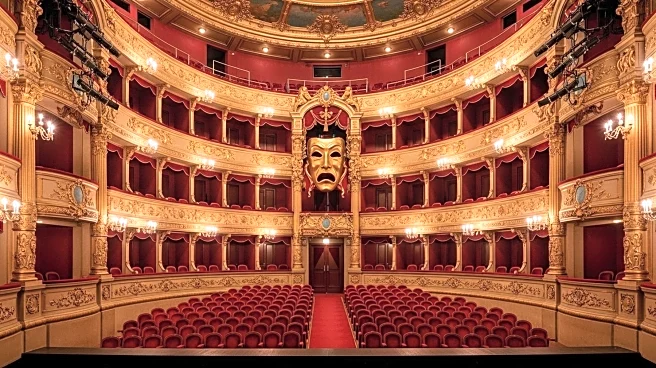What's Happening?
The Metropolitan Opera has opened its season with the adaptation of Michael Chabon's novel 'The Amazing Adventures of Kavalier & Clay,' composed by Mason Bates with a libretto by Gene Scheer. The opera, which explores themes of Americanness, Jewishness, and pop culture during World War II, was introduced with statements from Peter Gelb, the Met's general manager, and Senator Chuck Schumer of New York. Both emphasized the importance of artistic expression and free speech, referencing recent controversies involving public figures like Jimmy Kimmel. The adaptation aims to capture the novel's complex narrative and thematic depth, challenging the traditional simplicity of opera.
Why It's Important?
The opening of 'Kavalier & Clay' at the Met highlights ongoing discussions about the role of art in society and the protection of free speech. As cultural institutions face increasing scrutiny and political pressure, the Met's decision to stage this opera underscores its commitment to artistic freedom. This event may influence other arts organizations to take similar stands, potentially affecting public policy and societal attitudes towards censorship and expression. The opera's themes resonate with contemporary issues, offering audiences a reflective experience on historical and current cultural dynamics.
What's Next?
Following the premiere, the Metropolitan Opera may continue to engage in public discourse about artistic freedom, potentially collaborating with other cultural institutions to advocate for free speech. Audience reactions and critical reviews will likely shape the opera's future performances and its impact on the broader arts community. The adaptation's success could lead to more complex literary works being transformed into operatic productions, expanding the genre's narrative scope.
Beyond the Headlines
The adaptation of 'Kavalier & Clay' into an opera raises questions about the intersection of literature and music, and how complex narratives can be effectively translated into operatic form. This endeavor may inspire future collaborations between composers and authors, fostering innovation in the arts. Additionally, the opera's focus on themes of identity and cultural change during wartime offers a poignant reflection on current global tensions and the role of art in navigating these challenges.









